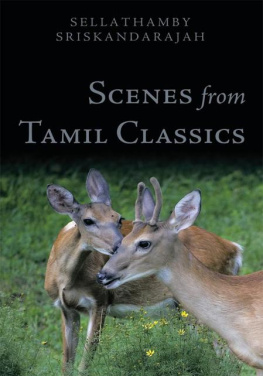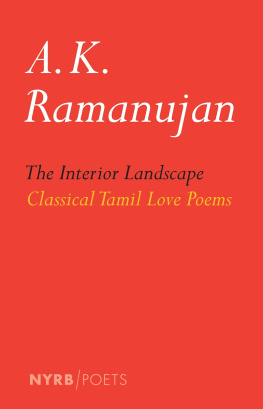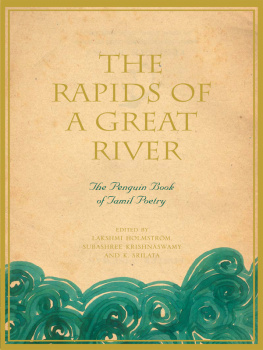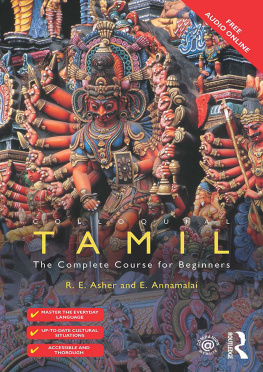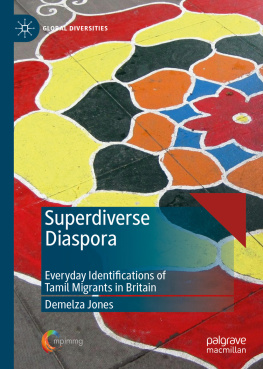SCENES from TAMIL CLASSICS
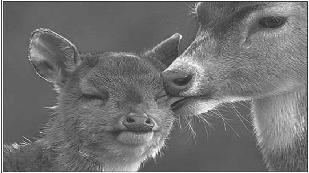
SELLATHAMBY SRISKANDARAJAH

AuthorHouse UK Ltd.
500 Avebury Boulevard
Central Milton Keynes, MK9 2BE
www.authorhouse .co.uk
Phone: 08001974150
2010 Sellathamby Sriskandarajah. All rights reserved.
No part of this book may be reproduced, stored in a retrieval system, or transmitted by any means without the written permission of the author.
First published by AuthorHouse 6/17/2010.
ISBN: 978-1-4389-4196-7 (sc)
ISBN: 978-1-4389-4197-4 (dj)
ISBN: 978-1-4670-0362-9 (eb)
Contents
To
MY LATE FATHER IN LAW AND TAMIL SCHOLAR
DR VIDWAN K.N. VELAN
Although this small work is intended for Tamil readers, nevertheless with a view to obtaining a nonpartisan opinion on it from a native English speaker, I showed the draft of this book to Mr. Alastair Robin McGlashan, a scholar in Greek classics and Tamil studies. Mr. McGlashan, who is a many-faceted scholar, has just completed the translation of Cekkilrs Periya Purnam which contains more than four thousand verses. I am indebted to Mr. McGlashan for the nice Foreword he has written and for the many constructive suggestions he offered during the preparation of this book. I thank him wholeheartedly.
Dr. Avvai Natarajan, a Tamil scholar of international reputation and emeritus Vice Chancellor of the Tamil University of Tanjore was kind enough to look through the book at the manuscript stage and to write a wonderful Appreciation. I am eternally indebted to him.
Professor V. C. Kulandaiswamy, a poet of great repute and one time Vice Chancellor of the Indra Gandhi National Open University, has added weight and value to my book by his valuable and constructive Introduction. I am grateful to him for the honour he has done me.
I will be failing in my duty if I fail to record the help rendered by Miss Thulasi Mageswaran M.Sc, Mr.K.Jeyakumar FIAB, MAAT and Mrs.Shobana Janakan M.Sc all of whom had the indefatigable patience to type out the various drafts of this book which I amended and modified times without number. I thank them all wholeheartedly. I am grateful to Mr Arunan Sriskandarajah LL.M for the beautiful cover design of this book as well as for the many other useful suggestions of artistic significance.
Finally I thank Author House Publishers for publishing my work beautifully with a welcoming smile
S. Sriskandarajah
66, Westrow Gardens
Seven Kings, Ilford,
Essex IG3 9NF
United Kingdom
The Tamils are the proud owners of a rich treasury of literature. Though they are an ancient race, still they dont have a country of their own. In India, they occupy a state called Tamil Nadu, which has no sovereign status. The political storm in Sri Lanka has forced the Eelam Tamils to flee Sri Lanka and to seek refuge on foreign soil in the West. The situation in the West is not conducive to the study of Tamil literature and other matters relating to Tamil art and culture. Their situation is such that willy-nilly Tamil children are compelled to pay less and less attention to the study of Tamil language and literature. Such unfortunate children cannot be expected to gain access to Tamil literature through their imperfect knowledge of Tamil language. However, not to make an attempt to teach them the great gems of Tamil literature would be a crime.
I therefore thought of the idea of giving them a foretaste of Tamil literature through English. I made a similar attempt fifteen years ago and produced a book in English called The Ethical Essence of The Tamils which is a commentary on selected Tirukkura! couplets. The present book is a fruit of my second attempt. If my experience with my earlier book is anything to go by, I can hope that the children of the expatriate Tamil community will find this small work very useful.
I have selected the poems for this book randomly. Though I had wished to give a typical example from each of the collections of the Ancient period, the fear that such a laudable attempt would be expensive and time consuming has prevented me from so doing.
I started work on these literary paintings almost fifteen years ago. Some of the episodes in this book were published in a fortnightly called Tamil Nation. When the publication of Tamil Nation was discontinued, my urge for writing such literary pieces also sagged though I continued to write them once in a blue moon and preserved the manuscripts.
This book contains thirty-seven of such paintings, the majority of which are scenes from the ancient classics. Kampan and Avvaiyarare great names although strictly they do not belong to the classical period. Their works are of commendable quality and reputation. In recognition of their merit I have chosen a few verses from their works for the purpose of this book. The late Mr.J.V.Chelliah, a great Tamil scholar of Sri Lanka who translated many ancient Tamil verses into English, declared with pride and justly that we are the trustees of a rich heritage, and it is our duty to share with the rest of the world, the best that has been said and written by our forefathers. I am glad that through this small work I am able to fulfil at least a part of his wish.
This book is primarily intended for expatriate Tamil children. However I am confident that non Tamil speakers who are interested in literature also will find the book useful and interesting.
S.Sriskandarajah, B.sc., LL.M
I count it an honour to be invited to contribute a few words by way of a Foreword to Mr Sriskandarajahs Scenes from Tamil Classics. I greatly appreciate the service which the author is performing, by means of this and his other published works, to popularize Tamil literature among those who cannot read it in the original.
This group of Tamils must of course primarily include the children of Tamil families which have come from South Asian countries and settled in the West. More than some other immigrant communities, Tamil people in the United Kingdom seem to tend naturally and easily to become assimilated to the host culture. There are gains in that, but also losses. Particularly, as the children of such families are educated within the English school system, they are in danger of growing up unable fluently to read and write their mother tongue. Thus they lose touch with the riches of the culture in which their parents were reared in India and Sri Lanka.
The children of first generation immigrants are inescapably placed in a situation of great difficulty. They are caught in what must be a most uncomfortable tension between the culture of the school and the ambient society on the one hand, and that of the family on the other. At a deeper level this can only give rise to profound questions about their sense of identity. Who are they, where do they belong, and whose norms do they adopt? I applaud the strenuous efforts made by the author of the present work and many like him who through voluntary weekend classes in many parts of London attempt to nurture in the rising generation knowledge of, and a sense of belonging to, their traditional culture.
Of course, the entirety of the British population has to be included in the number of those who cannot read the Tamil classics in the original. But, sad to say, the level of interest not only in Tamil, but more generally in the languages and culture of the Indian sub-continent as a whole seems currently to be at a very low ebb. In the old days of the Raj there were many British people whose whole working lives were spent in the East. Some of them became proficient in Indian languages and extremely knowledgeable in various fields of Indian studies. But those days are long gone, and British contact with South Asia is limited to fleeting visits by tourists and business people, who may indeed be impressed and fascinated by what they see of the local cultures, but have neither the time nor the inclination to embark on deeper study. There seems to be little prospect of this situation changing in the foreseeable future.
Next page
